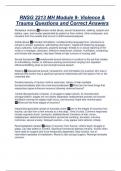RNSG 2213 MH Module 9- Violence &
Trauma Questions and Correct Answers
Workplace violence ✅includes verbal abuse, sexual harassment, stalking, assault and
battery, rape, and murder perpetrated by patient or their visitors, other employees, and
intruders from the outside that occurs to staff/nurses/employees
Verbal abuse ✅includes intimidation, condescending language/tone, reluctance or
refusal to answer questions, withholding information, negative/threatening language,
angry outbursts, rude gestures, property damage, threats to or actual reporting of the
nurse to a manager, ostracism, offensive notes/email, criticism, humiliation, screaming,
and threats with weapons. Has been linked to high turnover of nursing staff.
Sexual harassment ✅unwelcomed sexual advance or conduct on the job that creates
an intimidating, hostile, or offensive working environment ranging from repeated
offensive/belittling jokes to porn/outright sexual assault
Stalking ✅obsessional pursuit, harassment, and intimidation by a person who has or
believes that he/she has a significant personal relationship with the object of his or her
unwanted attn.
Duration/severity of trauma; victim's resources; nature of help available
during/immediately after the crime/trauma/disaster ✅What are the three things that
researchers agree influence recovery following violence/trauma?
1)Initial disorganization (impact). 2) struggle to adapt (recoil). 3) reconstruction
(reorganization); stages are not clearly separated; readjustment process not smooth.
Vacillation among the stages might occur, and recovery might take months/years
✅What are the three stages of recovery?
Impact/disorganization phase of traumatic event ✅one of the stages of recovery from
trauma; can last from a few minutes to a few days. Time of crisis. Common responses
include cognitive shock, confusion, disbelief/denial. Emotions of fear, horror,
helplessness; detachment/dissociation (emotional numbing, amnesia), intrusive
memories, severe anxiety. Delayed reaction—may appear calm/rational, initially.
Recoil/adaptation phase ✅stage of recovery from trauma; victims begin struggle to
adapt. Can last weeks to months. Significant emotional distress remains. Victims often
have need for support and to be temporarily dependent. May function, but w/
intermittent episodes of breakdown. Wants to talk and get support. Revenge fantasies
common.
, Reorganization phase ✅stage of trauma recovery; can last months to years. Trauma
not forgotten, but anxiety, fear, and anger diminish. Victims reconstruct their lives,
review and organize what happened and why ("why me?"); attributing blame to
self/others/both; justifying one's actions at the time & later; regaining sense of
control/self-protection. Grief resolves slowly.
Failure to progress to next level of recovery. Exposure to additional trauma.
Experiencing significant life stressors. Dysfunction may reoccur when future stress is
experienced. ✅What are some challenges to recovery from traumatic events?
Provide safety, meet basic needs; offer support; assess risk for further injury/suicide;
provide information and access to other resources ✅What are nurse-patient
relationship goals for client in impact/disorganization phase (crisis)?
Validation of worth/rights of victim. Referral to victim's assistance program for
legal/insurance/financial assistance. Short-term counseling, if needed. Support groups
with others who have "been there." ✅What are nurse-patient relationship goals for
client in recoil/adaptation phase?
Long-term counseling to overcome anxiety, phobias, depression, suicidal ideation, or
other posttraumatic symptoms. Assess adaptive coping vs. maladaptive responses and
needs for continued services. Recognize that healing takes time and progress is not
always steady ✅What are nurse-patient relationship goals for client in Reorganization
phase?
Acknowledge client's emotions. Show unconditional acceptance. Follow necessary legal
guidelines for obtaining information or evidence. Support problem-solving, when client
able. Provide information at level client can absorb. Offer hope. ✅What are some
helpful responses by a nurse when communicating with a trauma survivor?
Trauma of terrorism is more pervasive, long-lasting, and severe than other violent
crimes because it is not only perpetrated by humans, but purpose is to
terrorize/kill/injure targeted groups and generate fear of reoccurrence ✅How does the
trauma of terrorism differ from that of other violence?
Rape ✅in general, considered forcible penetration of victim's body by perpetrator's
penis, fingers, or object w/out consent. Laws/attitudes can vary state-to-state. Generally
acknowledge that rape is not sexually motivated, but involves a desire for power and
control, wish to humiliate the victim, and playing out of sexual fantasy.
Collect forensic evidence. Medical attention. S.A.N.E. (Sexual Assault Nurse Examiner)
or Crisis specialist. Follow-up important. Referrals to legal advocacy and victim's
assistance; support group for survivors ✅What are some interventions specific to the
rape/sexual assault survivor?




